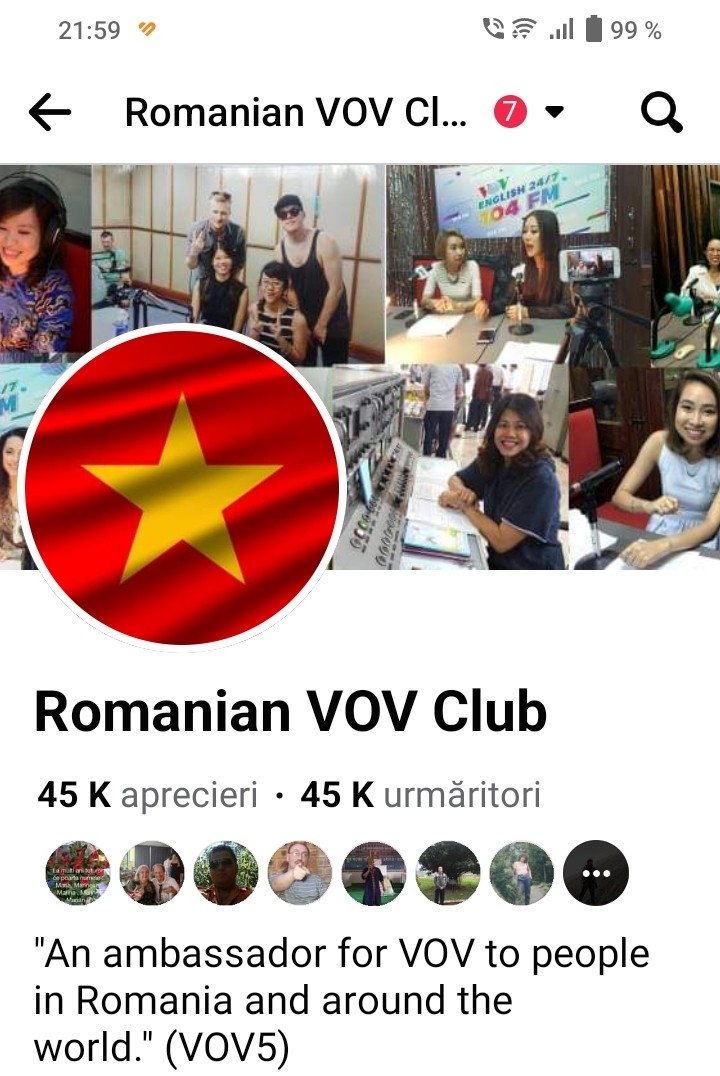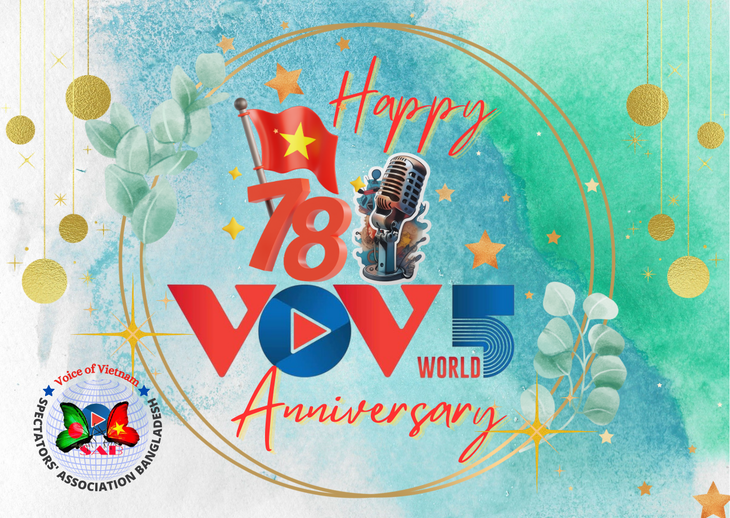 "Romanian VOV Club reached 45,000 likes on its Facebook page, probably the most followed page of VOV clubs," said Vicentiu Daniel Gheorghe of Romania. He told us: "It's a great honor and pleasure to promote VOV and Vietnam in Romania and in the world. We want to be a real ambassador of your beautiful country that we love with all our hearts." "Romanian VOV Club reached 45,000 likes on its Facebook page, probably the most followed page of VOV clubs," said Vicentiu Daniel Gheorghe of Romania. He told us: "It's a great honor and pleasure to promote VOV and Vietnam in Romania and in the world. We want to be a real ambassador of your beautiful country that we love with all our hearts." |
A: Vicentiu Daniel Gheorghe of Romania wrote: “The significance of Vietnam’s National Day is profound for all Vietnamese people. The Democratic Republic of Vietnam, now the Socialist Republic of Vietnam, was founded on September 2, 1945, putting an end to feudalism and ushering in a new era and a new life for the Vietnamese people. President Ho Chi Minh read the Declaration of Independence on behalf of the provisional government at historic Ba Dinh Square.”
B: Praising Vietnam’s achievements over the pat 78 years and its expanded relations with other countries around the world, Gheorghe said “In honor of the 78th anniversary of Vietnam’s National Day, I wish you, Vietnam and VOV, a joyous and peaceful holiday with friends and family!”
A: The VOV Spectators Association of Bangladesh sent their best wishes for Vietnam's 78th National Day on September 2nd and VOV's 78th Founding Anniversary on September 7th. They said as the Central Fan Club of VOV in Bangladesh, they are honored to join in commemorating these significant milestones that hold a special place in their hearts.
 We thank the VOV Spectators Association of Bangladesh for sending us the e-postcard. We thank the VOV Spectators Association of Bangladesh for sending us the e-postcard. |
A: Their message said: “Vietnam's 78th anniversary of National Day is a momentous occasion that reminds us of the struggles and triumphs that have shaped your nation’s history. It serves as a beacon of hope and symbolizes the resilience and determination of the Vietnamese people. We stand in solidarity with you, celebrating the freedom and sovereignty that Vietnam has achieved over the years.”
B: “VOV has been our window to Vietnam's culture, news, and stories through the years. Your commitment to excellence in broadcasting has forged a strong bond between our nations, transcending geographical boundaries. As members of the VOV Spectators Association of Bangladesh, let us continue to strengthen the cultural ties between our countries and promote the values of friendship and cooperation. Together, we can ensure that VOV's legacy continues to thrive, fostering goodwill and understanding between our nations.”
A: Ashik Eqbal Tokon of Bangladesh said: “Happy 78th Anniversary of VOV Broadcasting and Congratulations on Vietnam's 78th Independence Day! Vietnam's 78th Independence Day is a testament to the strength and unity of your nation. Over the years, you have overcome countless challenges, and your determination has led to progress and prosperity. As we look ahead to the future, let us continue to celebrate the achievements of VOV and Vietnam.”
B: Rabi Sankar Bosu, Founder and President of the New Horizon Radio Listeners’ Club in West Bengal, India, said: “I would like to extend my heartfelt congratulations to you all at the Voice of Vietnam World Service as well as to the more than 99 million Vietnamese people on the glorious occasion of the 78th founding anniversary of the founding of the Socialist Republic of Vietnam.”
A: Many thanks to all our dear listeners for your emotional and support for Vietnam and VOV. Before we move on to other letters and reception reports from listeners, enjoy this song called “The Flag” by Ta Quang Thang.
B: The song talks about Thang’s emotions, patriotism, and national pride. He was born after national reunification and didn’t experience the war, just his father’s stories of fighting for national independence and his mother’s determination during those tough times.
A: Last week we got a letter from Germanas Politika of Lithuania, who listened to VOV’s English program on July 3 on the frequency of 11885 khz and rated SINPO 53543. He noted sideband splashes from 11895 khz China Radio and 11880 khz Adventist World Radio.
B: Mr. Politika noted the content he was interested in, including the news of the Vietnamese Embassies in Australia and New Zealand hosting a farewell meeting with the Vietnamese women’s football team, the Current Affairs segment on economic diplomacy, and our Colorful Vietnam piece on the Khmer culture in Soc Trang province.
A: Thank you, Mr. Politika, for your feedback. We’ll forward your technical notes to our technicians.
B: I’m reading a letter from Harald Suss of Austria, who says: “I was glad to hear your broadcast here in Austria. I’m spending 2 weeks at a DX Camp in southern Austria at a place called Dobriach. I live in my tent. The group is listening to radio stations.”
A: Mr. Suss tuned in to VOV’s program on July 27 on the frequency of 11885 khz. He rated SINPO 43343.
B: Thank you, Mr. Suss, for listening and sending us your feedback. We surely will continue our shortwave transmissions as you have requested.
A: Fumito Hokamura of Japan sent us a reception report for our program on August 12 on the frequency of 12020 khz. He said that, as usual, he heard news about Vietnam and enjoyed some Vietnamese folk songs, which often have a nostalgic melody. Hokamura asked about the history of Vietnamese folk music.
B: Vietnamese folk songs are passed down from generation to generation in the community. Each of Vietnam’s 54 ethnic groups has its own own folk music with unique features. The folk music of each locality has different melodies and lyrics, so music can be classified by region (northern, central, or southern).
A: Researchers say Vietnamese traditional music began in ancient times, and people have always considered music an indispensable part of daily life, ceremonies, festivals, weddings, funerals, and theater. The most popular genres of Vietnamese traditional music are Hue Royal Court Music, Cheo (popular theater), the Xam singing, Quan Ho duet singing, Chau Van (mediumship ritual singing), Ca Tru (ceremonial singing), Tuong (classical opera), Ho chanting, Hue folk singing, and Don Ca Tai Tu (southern amateur singing).
B: Hue Royal Court Music evolved through several dynasties, from the Ly dynasty in the 11 century to the Nguyen in the early 20th century. It was recognized by UNESCO as a Masterpiece of the Oral and Intangible Heritage of Humanity in December 2003.
A: Quan Ho folk singing is a typical genre in the Red River Delta, especially in Bac Ninh and Bac Giang province. Research has been unable to confirm the birth of Quan Ho. Some say the 11th century. Others say the 17th century or later. It was recognized by UNESCO as an intangible cultural heritage on September 30, 2009. Quan Ho folk songs can be seen performed in Bac Ninh province, especially during festivals.
B: Ca Tru used to be a type of royal entertainment and was loved by aristocrats and scholars. It combines singing with a number of traditional musical instruments. Ca Tru was recognized as an Intangible Heritage in Need of Urgent Protection by UNESCO in 2009. Nowadays, you can hear Ca Tru at Ca Tru clubs in many northern localities, and especially at the national Ca Tru festival organized by the Ministry of Culture, Sports and Tourism.
A: Ho, chanting, is a cultural feature of the central and southern regions. Ho singing was originally a call and response between river boatmen, but then working people began to do it anywhere and at any time. Ho Vi Giam, a style popular in Nghe An and Ha Tinh province, was recognized by UNESCO as an Intangible Cultural Heritage of Humanity in 2014.
B: Don Ca Tai Tu is music from southern Vietnam. It originated as a five-tone music developed in the 17th century from the Hue Royal Court music and music of the south-central region. It was officially recognized by UNESCO as an Intangible Cultural Heritage of Humanity in 2013.
A: For a demonstration of each folk music genre, please visit to our website. Once again, thank you all for tuning in to VOV and sharing your love of our country. We welcome your feedback at: English Service, VOVWorld, the Voice of Vietnam, 45 Ba Trieu street, Hanoi, Vietnam. Or you can email us at: englishsection@vov.vn. You’re invited to visit us online at vovworld.vn, where you can hear both live and recorded programs.